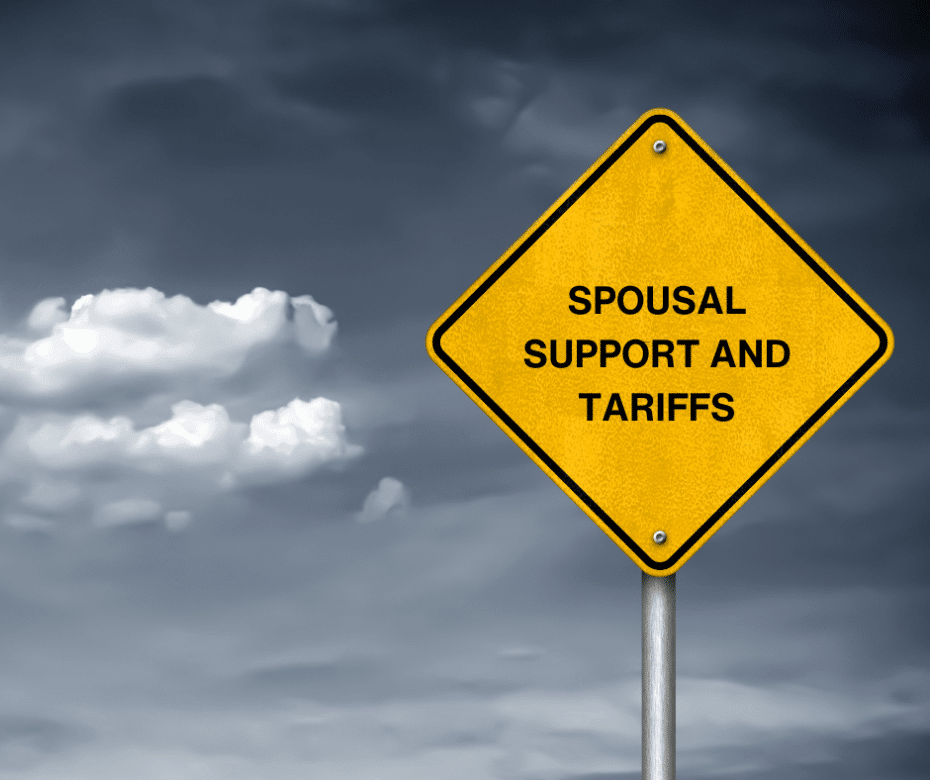Call Us At 519.672.5666
Insights & Articles
Tariff Trepidation: Would Industry Changes or Job Loss due to Tariffs be Adopted by Courts as a Catastrophic Change to Spousal Support Obligations?

Let’s say you work in the automotive industry, and you are realizing your company is being hit hard by the tariffs. You are not getting contracts like you were in 2024 and several people on your team have been laid off. Can you lower your spousal support payments if that happens to you?
When circumstances change drastically, both parties may seek to adjust the support amounts. But what constitutes a “catastrophic change in circumstances” that justifies altering the spousal support agreement? Canadian courts have grappled with this question in various cases, and the answer isn’t always clear-cut.
What is a catastrophic change in circumstances?
The term “catastrophic change in circumstances” is frequently reference in separation agreements, but it is not a defined term under the Divorce Act. In fact, the court in Rokach v. Rokach (2021)1 noted that the phrase is not a settled concept in Canadian family law. However, in certain cases, drastic changes to a party’s financial situation – especially concerning income – can trigger the need for revisiting spousal support arrangements.
One such example occurred in the Roberts v. D’Amico case (2021),2 where the court found that the severe impact of the COVID-19 pandemic on the husband’s employment at Air Canada constituted a “catastrophic change in circumstances.” Due to reduced air travel, the husband’s income plummeted, and the court acknowledged that this situation necessitated a reconsideration of his spousal support obligations. In this case, the change was not merely an adjustment, but a significant shift in the payor’s financial reality.
While the idea of a “catastrophic change in circumstances” may seem straightforward, legal precedent highlights that not all changes to income are grounds for altering spousal support. For example, in Slater v. Slater (2010),3 an arbitration award mandated that the husband pay $10,000 per month in spousal support, with the provision that the support amount could only be altered due to a “catastrophic and unforeseen change in circumstances.”
In this case, when the wife remarried, the husband sought to reduce or terminate his spousal support obligation. He argued that the wife’s remarriage to a new partner should be considered an unforeseen change. However, the court rejected his argument, ruling that the remarriage was foreseeable and did not constitute a “catastrophic change.” The court held that such life events, while significant, do not trigger a need to revise spousal support unless they represent an unexpected and extreme shift in circumstances.
Life is always changing – what changes are unforeseeable to Courts?
This distinction between “foreseeable” and “unforeseeable” changes is critical. For example, in Bradley v. Bradley, the wife’s deteriorating health was considered foreseeable in the sense that it was known she had health issues. However, the extent of her health decline – and the resulting financial implications – was not foreseeable. The court determined that even though the change was based on a known contingency, the extent of the impact was not predictable, which qualified as a “material change in circumstances.”
Conclusion
When a catastrophic change does occur – whether due to job loss, health deterioration, or an external event like a global pandemic or introduction of tariffs – parties may be entitled to apply for a variation in spousal support. The key issue will always be whether the change in circumstances is truly drastic and unforeseen.
While not every change to income or life circumstances qualifies as catastrophic, significant and unforeseen changes may allow a party to seek a revision of spousal support. Individuals experiencing such changes should seek legal advice from knowledgeable lawyer like those at McKenzie Lake to determine whether their situation justifies a modification of spousal support.

This article was written by Family Law Lawyer, Katrina Wiegers.
If you require assistance with any Family Law matter, speak to a Family Lawyer at McKenzie Lake Lawyers LLP by calling (519) 672-5666.
- https://www.canlii.org/en/on/onscdc/doc/2021/2021onsc7361/2021onsc7361.html?resultId=8c6952583b2e4ca8b6f0942a4ceba862&searchId=2025-04-04T09:06:05:312/726a06ce980342a2815cdd975371a12c ↩︎
- https://www.canlii.org/en/on/onsc/doc/2021/2021onsc707/2021onsc707.html?resultId=f7501b512c0248bd970c6ccbdea72d00&searchId=2025-04-04T09:06:19:561/340156417fb74bb79613501f681c7fa8 ↩︎
- https://www.canlii.org/en/on/onsc/doc/2010/2010onsc5737/2010onsc5737.html ↩︎

